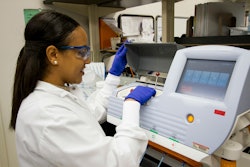Human Genome Center Launched at Howard University
By Ronald Roach
WASHINGTON
Earlier this month, Howard University officials commemorated the establishment of a National Human Genome Research Center (NHGC) at the Howard University College of Medicine. The center, the first to be launched at a minority-serving institution in the United States, will focus on genetic research that has major health implications for people of African descent.
“We’re here to celebrate excellence,” noted Dr. Warren K. Ashe, the associate dean for research at Howard’s medical school, of the ceremonies that marked the commemoration of the new research center.
The research center certifies Howard University’s prominence in a science field that promises to transform human understanding of biology and is expected to lead to dramatic medical breakthroughs. Over the past few years, researchers affiliated with Howard’s genome research center have been participating in a global research collaborative known as the Human Genome Project.
Since the late 1980s, the Human Genome Project (HGP) has operated as an international research program to construct detailed genetic and physical maps of the human genome, to determine the full nucleotide sequence of human DNA and to localize the 30,000 to 40,000 genes within the human genome. The project also analyzes the genomes of other organisms used in research laboratories. The scientific results of the genome project are generating detailed information about the structure, organization and function of human DNA.
“The NHGC at Howard University is a comprehensive resource for genomic research on African Americans and other African Diaspora populations, distinguished by a diverse social context for framing biology as well as the ethical, legal and social implications of knowledge gained from the Human Genome Project and research on genome variation,” according to the Howard NHGC vision statement.
Federal officials say that by decoding the human genome, the development of new technologies, medicines and medical treatments will become possible. Improved technology for biomedical research will result from the Human Genome Project.
“If we can get a better picture on genetic factors, we can understand more about how environmental factors play a role in health and disease,” says Dr. Francis Collins, director of the National Human Genome Research Institute at the National Institutes of Health.
Dr. Georgia Dunston, who is acting director of the center and a renowned microbiologist, leads Howard’s genome research center. Dunston is credited with the establishment of the Human Immunogenetics Laboratory at Howard. The laboratory serves as the base for the research activity on the human genome program at the Washington, D.C., university.
Researchers at Howard’s genome research center have taken the lead in a global research effort, known as Genomic Research on the African Diaspora (GRAD). The GRAD project is looking at genetic conditions among African Americans, other peoples of African descent and African populations to establish epidemiological databases and models of gene flow among populations. The chief objective of GRAD is the collection, assembly and distribution of genome research on African Diaspora populations.
© Copyright 2005 by DiverseEducation.com


















